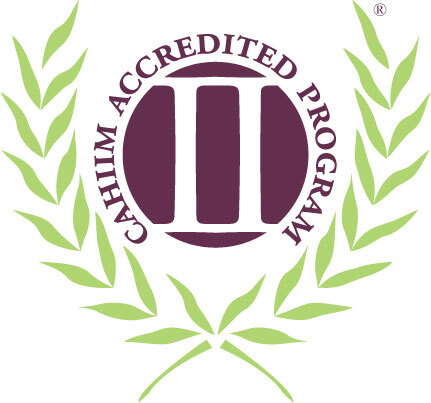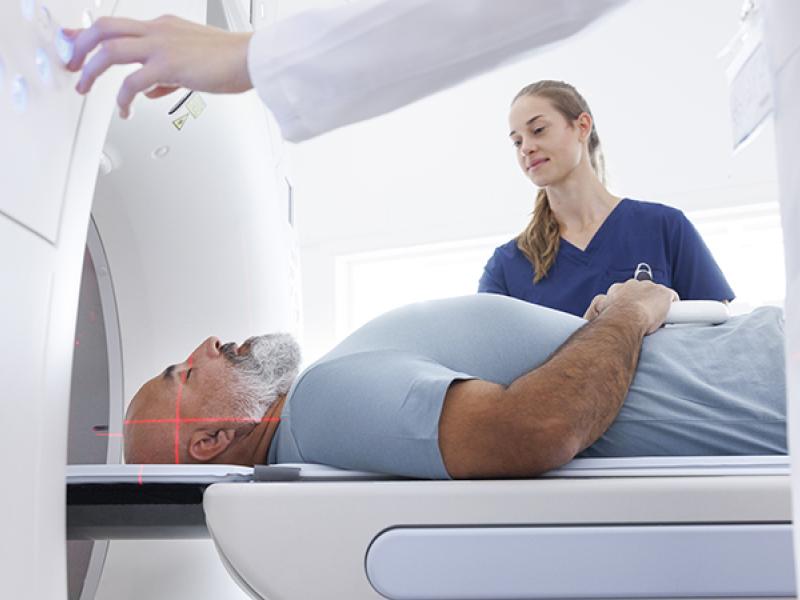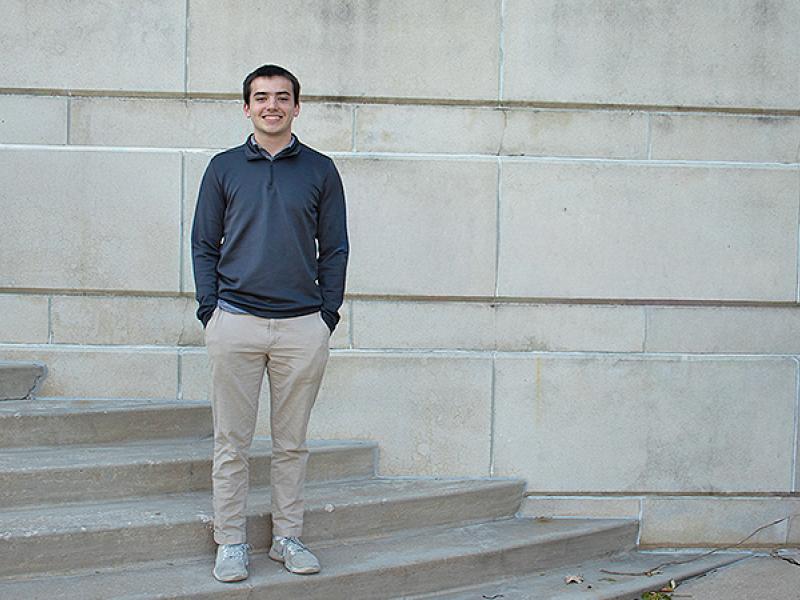The University of Missouri, home to the world’s first computerized laboratory system, has been a leader in biomedical informatics research since the 1960s. The University began offering training in biomedical informatics in the 1970s and counts among its alumni some of the leading figures in the field. Today, that tradition of excellence continues in the Health Informatics Graduate Programs offered by the Biomedical Informatics, Biostatistics and Medical Epidemiology Department.
Students graduating from the programs will be able to pursue careers in a wide range of healthcare organizations and related settings, such as hospitals and clinics, pharmaceutical firms, health insurance companies, research labs, governmental and non-governmental agencies, and beyond. The programs focus on understanding, designing, and developing information technologies to transform and integrate into today’s health systems and fosters students’ research interests in biomedical informatics.
Read more in our Student Handbook.
Master of Science in Health Informatics

Residential MS Program
The CAHIIM accredited traditional, on-campus health informatics program prepares professions to lead development and use of electronic health records and other information systems in the health care environment.
Executive MS Program
Our CAHIIM accredited executive health informatics program integrates technical, clinical and managerial competencies into health and biomedical informatics education for experienced health care professionals.
Graduate Certificates
All BBME graduate certificates are options for masters students to do concurrently with their degrees.
Graduate Certificate in Health Informatics
The graduate certificate in health informatics is designed to serve as both a stand-alone certificate program for non-degree learners interested in health and biomedical informatics and an integrated certificate program for degree-seeking University of Missouri students who are enrolled in a graduate degree program.
Graduate Certificate in Health Ethics
The graduate certificate in health ethics is designed to help learners develop an understanding of the ethical issues related to health and health care and to foster skills in analyzing and resolving ethical problems and conflicts in the health care environment.
Graduate Certificate in Project Management
The graduate certificate in health care project management provides participants an in-depth understanding of the fundamentals of project management and its application to health care. A problem-based approach is used to frame both the theoretical underpinnings of project management and hands-on learning, including agile project management.
Doctor of Philosophy in Informatics
Informatics PhD Program
The doctorate in informatics, with an emphasis in health informatics, prepares individuals for research and scholarly careers in the application of information technology to health systems. The Informatics PhD is offered through the MU Institute for Data Science and Informatics.
More detailed course descriptions are available.
Admissions Process
Admission Criteria
- Minimum GPA: 3.0
- Bachelor's degree from an accredited college or university
- International students whose native language is not English must submit test scores from TOEFL (Test of English as a Foreign Language) of 100 or better on the internet-based exam or IELTS (International English Language Testing System) of 7.0 or better, or Duolingo scores of 120 or better.
- Please refer to Mizzou’s Language Proficiency Exemptions and Waivers
- Only completed applications will be considered for fall admission. Applicants are selected for admission to the program based on their potential to successfully complete the program.
- Graduate School applications are accepted on a rolling basis.
Required Application Materials
- Completed graduate school online application
- Unofficial transcripts
- Three letters of recommendation (submitted through the graduate school application)
- A personal statement in essay form that is at least two paragraphs long but no longer than one page. The statement should include your prior training and experience that would make you a strong candidate for the program; your career goals and how the program will contribute to your success; and specific topics or areas in biomedical informatics you would like to focus on.
- An updated resume or curriculum vitae.
Frequently Asked Questions (FAQs)
Admissions & Application Process
- Q: What are the admission requirements for BBME graduate programs?
Applicants must have:- A bachelor's degree (minimum GPA 3.0)
- Official or unofficial transcripts
- Three recommendation letters
- A personal statement
- A current CV or resume
International applicants must also submit proof of English proficiency:
TOEFL (≥100), IELTS (≥7.0), or Duolingo (≥120).
- Q: Is the GRE required for admission?
No, the GRE is not required for any BBME program. - Q: What is the application deadline?
BBME uses rolling admissions (applications accepted year-round).- Preferred start: Fall for master’s programs
- Q: How do I apply?
Applications are submitted online through the MU Graduate School portal.
Program-specific details can be found here:
👉BBME Graduate Programs - Q: Can I transfer credits from another institution?
Graduate-level courses may be transferred (up to 20% of program requirements) upon approval. Undergraduate credits cannot be transferred into graduate programs.
Program Information
- Q: What programs does BBME offer?
- MS in Health Informatics (Residential): 40 credits, in-person, thesis required, optional 12-week internship.
- MS in Health Informatics: 40 credits, online, thesis required.
- Graduate Certificates (12 credits each):
- Health Informatics
- Health Care Project Management
- Health Ethics
- Q: How long does it take to complete the MS program?
Typically 2 years (4 semesters) for full-time students. Part-time options are available. - Q: Can I start with a certificate and later apply it toward the MS degree?
• Yes. Some credits from a BBME graduate certificate (e.g. Health Informatics or Healthcare Project Management) can count toward the MS in Health Informatics. - Q: Are your programs online or in-person?
- Residential MS: In-person at Mizzou.
- Executive MS: Fully online.
- Healthcare Informatics Certificate: Online or in person.
- Healthcare Project Management Certificate: Fully online.
- Health Ethics Certificate: Online or in person.
- Q: What certifications can these programs prepare me for?
- Project Management Certificate: Prepares students for PMP or CAPM certification.
- Informatics Programs: Prepare students for AMIA Health Informatics Certification (AHIC) or ACHIP credentials.
International Students
- Q: Are there special requirements for international students?
Yes. In addition to general admission materials, international students must demonstrate English proficiency via TOEFL, IELTS, or Duolingo. - Q: Does the program provide visa sponsorship?
Yes. The University of Missouri sponsors F-1 student visas for eligible full-time Residential MS students. Executive and certificate programs may not be suitable for F-1 visas due to their online format. - Q: Are there scholarships or funding opportunities for international students?
Yes. International students may apply for:- Departmental awards (e.g. Lindberg Scholarship, travel funds)
- Competitive Graduate Assistantships (limited availability)
- External fellowships or sponsor funding
Tuition, Fees, and Funding
- Q: What is the tuition cost?
Tuition varies by program and residency status. Current rates can be found on the MU Cashiers website. - Q: Are there funding or assistantship opportunities?
Yes, though limited.- Departmental awards: Lindberg, Ernst & Young, and travel funds.
- University-wide graduate assistantships: Competitive positions that may include stipends and tuition waivers. Early application is recommended for funding consideration.
Career Development
- Q: What kind of careers do graduates pursue?
BBME graduates work in:- Hospitals and health systems
- Public health organizations
- Health IT companies
- Research and analytics firms
- Consulting and project management roles
- Q: Does the program offer career support or internships?
Yes. The Residential MS includes an optional 12-week internship. Career advising and networking opportunities are also available through BBME and the MU Graduate School.
General Information
- Q: Can I schedule a meeting to discuss the program?
Absolutely. We’re happy to meet by Zoom, phone, or in-person to discuss your interests and next steps.
Email: bbmeadmissions@missouri.edu - Q: Who can I contact for more information?
Email the BBME Graduate Programs Office at bbme@health.missouri.edu or visit our website:
👉 BBME Graduate Programs
Living in Columbia
Columbia, Missouri is a lively and welcoming city that provides all the entertainment, amenities and culture of a larger city with a lower cost of living. Learn more about what our city has to offer.







